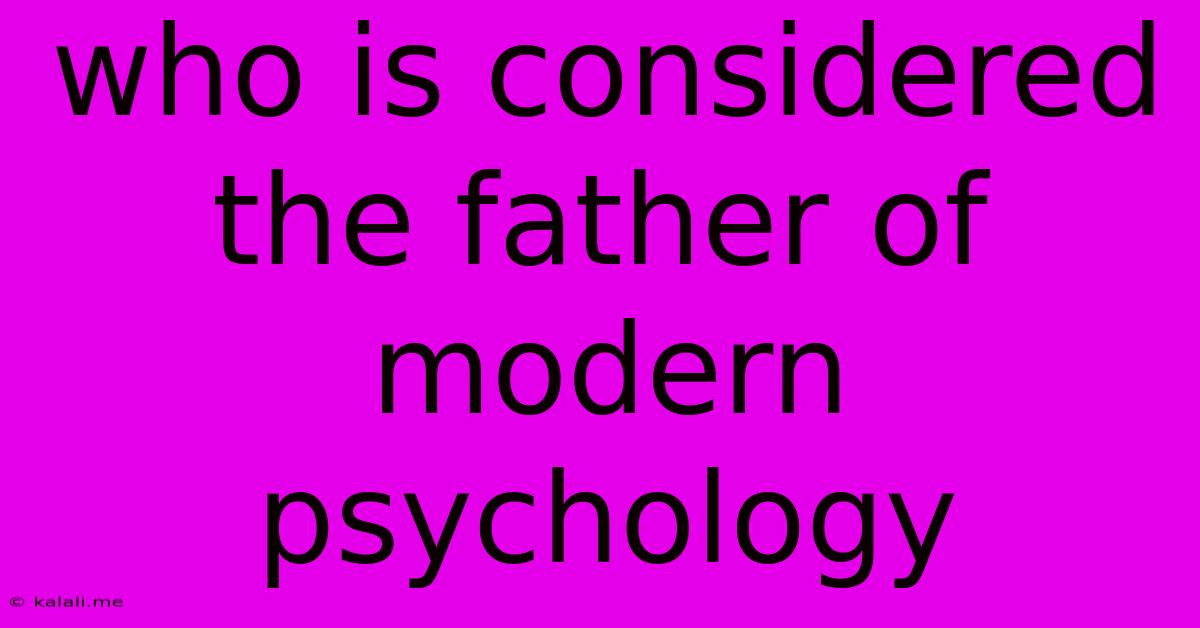Who Is Considered The Father Of Modern Psychology
Kalali
Jun 15, 2025 · 3 min read

Table of Contents
Who is Considered the Father of Modern Psychology? A Deep Dive into the Legacy of Wilhelm Wundt
The title of "Father of Modern Psychology" is often, and rightfully so, bestowed upon Wilhelm Wundt. While the study of the human mind has ancient roots, Wundt's groundbreaking work in the late 19th century established psychology as a distinct scientific discipline, separate from philosophy and physiology. This article will explore Wundt's contributions, examining why he's considered the foundational figure of modern psychology and acknowledging other significant influences in the field's development.
Meta Description: Discover who's considered the father of modern psychology. We delve into Wilhelm Wundt's pioneering contributions, exploring his establishment of the first psychology lab and the impact of his work on the field.
Wundt's Establishment of the First Psychology Laboratory:
In 1879, Wundt established the first psychology laboratory at the University of Leipzig in Germany. This pivotal moment marked a clear departure from philosophical speculation about the mind. Wundt's laboratory was dedicated to the empirical study of consciousness, using systematic observation and experimentation to understand mental processes. This scientific approach revolutionized the field, shifting it from a largely philosophical pursuit to a rigorous, experimental science. Before Wundt, the study of the mind was intertwined with philosophy, relying heavily on introspection and philosophical debate. Wundt's lab provided a framework for structured, reproducible experiments, allowing for the systematic collection and analysis of data. This established a path for future researchers to build upon, solidifying psychology's place within the scientific community.
Wundt's Method: Introspection and Structuralism:
Wundt's primary method was introspection, a systematic process of self-examination where trained participants reported their conscious experiences in response to controlled stimuli. While introspection has its limitations (subjectivity being a major one), it provided a structured approach to studying the basic elements of consciousness. This approach became the foundation of structuralism, a school of thought that sought to identify the fundamental components of consciousness – sensations, feelings, and images – and how they combined to form complex experiences. While structuralism itself eventually faded, its emphasis on systematic observation and the attempt to break down complex mental processes into smaller, manageable units laid the groundwork for future psychological research.
Beyond Wundt: Other Significant Contributors:
While Wundt is largely credited as the father of modern psychology, it’s crucial to acknowledge other significant contributors who shaped the field's early development. Figures like Hermann Ebbinghaus, who pioneered the study of memory, and Oswald Külpe, who challenged Wundt's emphasis on introspection, significantly advanced psychological understanding. Furthermore, the development of different schools of thought, like functionalism (championed by William James), expanded upon Wundt's foundational work, focusing on the purpose and function of mental processes rather than solely their structure.
The Lasting Legacy of Wilhelm Wundt:
Despite the criticisms and evolution of psychological thought since Wundt's time, his contribution remains undeniable. He established psychology as a distinct scientific discipline, providing the methodology and framework for future generations of researchers. His emphasis on empirical evidence, systematic observation, and controlled experimentation continues to be a cornerstone of modern psychological research. While approaches and theoretical frameworks have evolved, the legacy of Wundt’s rigorous scientific approach remains a fundamental pillar of the field. The establishment of the first psychology laboratory, although a simple act in itself, was a giant leap forward in understanding the human mind scientifically. This act irrevocably shifted the study of psychology from a philosophical exercise to a scientific pursuit, thereby securing Wundt's position as the father of modern psychology.
Latest Posts
Latest Posts
-
Which Of The Following Operator Has The Highest Precedence
Jun 15, 2025
-
What Is The Difference Between Peristalsis And Segmentation
Jun 15, 2025
-
What Is The Opposite Of Forbid
Jun 15, 2025
-
Which Of The Following Is An Example Of Synchronous Communication
Jun 15, 2025
-
Prime Numbers Between 80 And 90
Jun 15, 2025
Related Post
Thank you for visiting our website which covers about Who Is Considered The Father Of Modern Psychology . We hope the information provided has been useful to you. Feel free to contact us if you have any questions or need further assistance. See you next time and don't miss to bookmark.